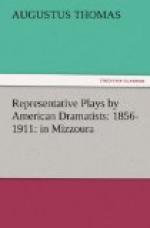But what accident brought the raw gumbo there? Perhaps the wheels of the stage-coach; but that wasn’t definitely Goodwin. The soft gumbo is not unlike putty; it would make a fair cushion for a broken limb: but I didn’t want to halt my story with anybody crippled to that extent; and then I remembered the yellow dog drinking from the blacksmith’s tub. I broke his leg and had Goodwin carry him miles in the stage, with his poor paw in a poultice of gumbo. It was a counter-pointing touch to a sheriff with two guns; it gave him an effective entrance; and it coupled in a continuous train, the sheriff, the bad man who sneered at it, the blacksmith and his motherly wife who sympathized and helped in a better dressing, the forge where a piece of the discarded gumbo should fall amongst the coke, the helper who should pump the bellows for another and verifying bake: and last, and best of all, it gave me a “curtain” for a second act; when, perturbed and adrift after being temporarily rejected by the girl, Goodwin should turn in an undefined but natural sympathy to the crippled dog in his box under the helper’s bench.
That illustrates one of the dramatist’s discovered rules: “If you use a property once use it again and again if you can.” It is a visual thing that binds together your stuff of speech like a dowel in a mission table.
There are few better places than a railroad train for building stories; the rhythmic click of the wheels past the fish-plates makes your thoughts march as a drum urges a column of soldiers. A tentative layout of the story established in the first act, the educated Kate, discontented in her blacksmith father’s surroundings; the flash fascination of our transient robber; the robber’s distinct lead over Goodwin’s accustomed and older blandishments. The second act saw Goodwin turned down and the robber preferred. The third act should see the robber’s apprehension and arrest. I milled around the question of his identification as Illinois and Indiana went past the Pullman window; and then the one sure and unfailing witness for that purpose volunteered—the express messenger himself. There was no reason why this young man shouldn’t be a native of Bowling Green, and come home from St. Louis at the




